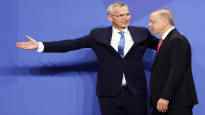Sweden’s negotiation connection with Turkey for the approval of the NATO application is cut off for the time being. The situation will be reviewed next time after the Turkish presidential and parliamentary elections in May.
That’s what a senior researcher at the Foreign Policy Institute thinks Toni Alaranta.
Minister of Foreign Affairs of Finland Pekka Haavisto (green) said on Tuesday in the morning of that Finland may have to reconsider promoting the NATO membership application at the same time as Sweden, if Sweden’s application seems to be stalling.
There was immediate concern in Sweden about Haavisto’s comments.
At a press conference held later in the morning, Haavisto moderated his statements. He said that Finland and Sweden’s joint NATO alliance will continue, and there is no backup plan.
Alaranta estimates that if it is not possible to make a compromise between Turkey and Sweden after the elections in Turkey, then we will be in a situation where Finland will have to start thinking about its own solutions regarding the NATO membership application.
The opposition still lacks a candidate for the presidential election
According to Alaranta, the Koran burning incident that took place last weekend in front of the Turkish embassy in Stockholm may unite the president Recep Tayyip Erdoğan ranks of supporters and thus support his electoral success.
– If he honestly comes to power through this wave, then he might calculate that it is possible to soften with Sweden within Turkey’s general NATO alignment, Alaranta says.
According to the researcher, it is also possible that Erdoğan wants to take revenge on Sweden, in which case the country’s NATO application could be stuck for a long time.
Turkey’s six-party opposition coalition has not yet nominated an official candidate for the presidential election. The announcement of the candidate is expected to take place within a couple of weeks. In addition, the Kurdish party HDP plans to nominate its own candidate for the presidential election.
According to Alaranta, there are three likely options for the opposition’s joint candidate. Among them are the chairman of the largest opposition party, the Republican People’s Party Kemal Kılıçdaroğlu and the popular mayors of Istanbul and Ankara belong to the same party.
Mayor of Istanbul Ekrem İmamoğlu charges have been filed against. According to Alaranta, the charges are political and they are an attempt to prevent him from becoming an official candidate.
Mayor of Ankara Mansur Yavaş on the other hand, is a hard-line nationalist, which makes him a less attractive candidate for many Kurdish voters.
The opposition has postponed the nomination of its candidate because it has not reached an agreement on the matter. Alaranta believes that the slowdown may also be related to election tactics. The opposition is trying to ensure the right moment to reveal the candidate.
– The day the official opposition candidate is announced, he is the target of a massive media smear campaign and attacks.
The researcher thinks that Erdoğan will win
Alaranta considers Erdoğan’s victory as the most likely result in the presidential election. However, that would only happen after the second round.
According to Alaranta, there are many floating votes in the second round, and a large part of them come from conservative Kurdish voters who are not enthusiastic about the opposition’s secularism. On the other hand, they are disappointed with Erdoğan’s Kurdish policy.
The researcher believes that the Kurds may decide the election.
– The biggest question mark is whether a democratic change of power is still possible in Turkey. I am skeptical about it, says Alaranta.
The researcher justifies his view by the fact that Turkey is celebrating its centenary year. President Erdoğan has been saying for years that the jubilee year is also the culmination of the so-called new Turkey he is building.
– Against this background, it is quite difficult to imagine a situation where Erdoğan would walk to shake the hand of the opposition leader who might have won the presidential election and retreat to the left.
An opposition victory could lead to a dispute
If the opposition candidate won the presidential election, then Erdoğan would try to challenge the result, Alaranta thinks.
Then the central election board would play a decisive role.
– Erdoğan loyalists have been pushed in there in recent years. The decisive thing is how it will work. Is it capable of objective independent decision-making?
If an opposition candidate were to become president of Turkey and the opposition could define the country’s foreign policy, it would ease the situation of Finland and Sweden’s NATO applications, Alaranta estimates.
According to him, the assumption is that when coming to power, the opposition would try to improve Turkey’s relations with Western countries to some extent and restore the line of cooperation within NATO.
Alaranta estimates that with the opposition in power, the ratification of the NATO applications would take place within a few months.
You can discuss the topic on Wed 25.1. until 11 p.m.
